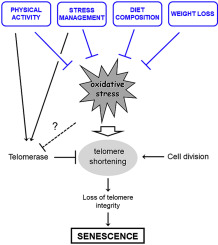当前位置:
X-MOL 学术
›
Free Radical Bio. Med.
›
论文详情
Our official English website, www.x-mol.net, welcomes your
feedback! (Note: you will need to create a separate account there.)
Oxidative stress, telomeres and cellular senescence: What non-drug interventions might break the link?
Free Radical Biology and Medicine ( IF 7.1 ) Pub Date : 2020-02-13 , DOI: 10.1016/j.freeradbiomed.2020.02.008 Jorge D Erusalimsky 1
Free Radical Biology and Medicine ( IF 7.1 ) Pub Date : 2020-02-13 , DOI: 10.1016/j.freeradbiomed.2020.02.008 Jorge D Erusalimsky 1
Affiliation

|
Telomeres are higher order structures that cap and protect chromosome ends. Telomeric DNA naturally shortens during somatic cell division and as a result of oxidative stress. Excessive shortening disrupts the integrity of the telomere, causing cellular senescence, one of the hallmarks of organismal ageing. The accumulation of senescent cells with ageing contributes to the loss of tissue homeostasis and the development of age-related pathologies. Hence, counteracting telomere shortening may be one relevant approach to develop strategies for healthier ageing. In this review I present the case for the existence of a link between oxidative stress, accelerated telomere shortening and cellular senescence. I also examine findings from human observational studies exploring associations between telomere length and oxidative stress-related parameters. Finally, I discuss results from randomised control trials testing the impact of non-pharmacological lifestyle interventions on the maintenance of telomere length, considering the potential mechanisms that might be involved.
中文翻译:

氧化应激,端粒和细胞衰老:哪些非药物干预措施可能会打破这种联系?
端粒是帽状并保护染色体末端的高级结构。端粒DNA在体细胞分裂过程中和氧化应激的作用下自然会缩短。过度缩短会破坏端粒的完整性,导致细胞衰老,这是机体衰老的标志之一。随着年龄的增长,衰老细胞的积累有助于组织稳态的丧失和与年龄有关的病理学的发展。因此,抑制端粒缩短可能是制定更健康老化策略的一种相关方法。在这篇综述中,我提出了氧化应激,加速端粒缩短和细胞衰老之间存在联系的情况。我还研究了人类观察性研究的发现,这些研究探索了端粒长度与氧化应激相关参数之间的关系。
更新日期:2020-02-20
中文翻译:

氧化应激,端粒和细胞衰老:哪些非药物干预措施可能会打破这种联系?
端粒是帽状并保护染色体末端的高级结构。端粒DNA在体细胞分裂过程中和氧化应激的作用下自然会缩短。过度缩短会破坏端粒的完整性,导致细胞衰老,这是机体衰老的标志之一。随着年龄的增长,衰老细胞的积累有助于组织稳态的丧失和与年龄有关的病理学的发展。因此,抑制端粒缩短可能是制定更健康老化策略的一种相关方法。在这篇综述中,我提出了氧化应激,加速端粒缩短和细胞衰老之间存在联系的情况。我还研究了人类观察性研究的发现,这些研究探索了端粒长度与氧化应激相关参数之间的关系。










































 京公网安备 11010802027423号
京公网安备 11010802027423号